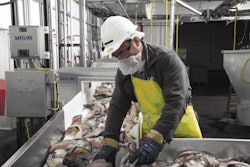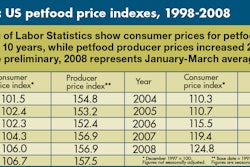A new Pennsylvania law aims to improve alleged "puppy mills." Here are some of the law's stipulations:
- It doubles the minimum floor space for cages;
- It requires regular outdoor exercise in an area at least twice the size of the dog's primary enclosure;
- It prohibits the use of wire flooring and requires flooring that allows for moderate drainage;
- It prohibits the stacking of cages;
- It requires veterinary examinations semi-annually;
- It mandates that only a veterinarian may euthanize an animal; and
- It requires unlimited access to water.
In my opinion, these are all steps in the right direction. The US Department of Agriculture-Animal and Plant Health Inspection Service (USDA-APHIS) lists more than 4,000 people and facilities as licensed breeders, so the law is good news for many thousands of dogs. I hope other states use Pennsylvania's law as a model.
Preying on consumers
Puppy mills are nothing new. These mass dog-breeding operations have been around for decades. They continue to thrive because they prey on unwitting consumers who are smitten by puppies in pet store windows and on fancy websites.
But, too often, behind the friendly facade of the local pet shop, the pastoral scenes on a "breeder's" website or the neighborhood newspaper ad, there may lie a puppy mill. These canine breeding facilities house dogs in shockingly poor conditions.
Life is particularly bad for "breeding stock," dogs that live their entire lives in cages and are continually bred for years, without human companionship and with little hope of ever becoming part of a family. These dogs receive little veterinary care and never see a bed, treat or toy. After their fertility wanes, breeding animals are commonly killed, abandoned or sold to another mill. The annual result of all this breeding is hundreds of thousands of puppies, many with behavior and/or health problems.
Several hundred thousand puppies are shipped cross-country to be sold in pet shops, but many are sold via newspaper classifieds or websites and are often accompanied by false claims such as, "We'd never sell puppies from a puppy mill" or promises that the puppies are "home raised, farm raised or raised with kids/grandkids." The ploys of the puppy mill are designed to dupe a well-intentioned family into buying a puppy and keeping the engine of cruelty working overtime.
Law and order
Because a puppy mill is a business, the facility is designed purely for profit, not for the well-being of dogs. Laws are on the books to provide minimum care standards for puppy-mill animals, but enforcement has historically been spotty at best.
The USDA licenses and inspects "commercial breeding facilities" for violations of the Animal Welfare Act. Also, a handful of states have laws that provide oversight of some breeding operations. But puppy mills can successfully navigate around these laws, either by selling directly to consumers (thereby avoiding USDA licensing requirements) or by simply avoiding the reach of law enforcement (with so few USDA inspectors and minor fines, it's easy to stay in business). Note that research facilities, such as those that test petfood palatability, are exempt-they already are subject to the Animal Welfare Act.
Congratulations to Pennsylvania for its humane efforts. It has set a good example for other states.



.png?auto=format%2Ccompress&fit=crop&h=167&q=70&w=250)
.png?auto=format%2Ccompress&fit=crop&h=167&q=70&w=250)












